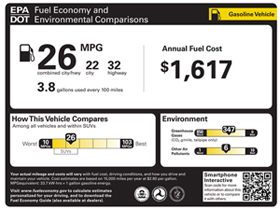Time to Stop Measuring Fuel Economy in MPG?
/https://tf-cmsv2-smithsonianmag-media.s3.amazonaws.com/filer/20110520102406fueleco2008.jpg)
Today, if you go to buy a new car, you'll find a sticker like the one on the right giving you a bunch of data on fuel economy: the miles per gallon you'll get on the highway and in the city and the estimated annual fuel cost (based on 15,000 miles driven over a year and gas costing $2.80 per gallon). You'll also see a little diagram that rates and compares that vehicle's fuel economy with others in its class.
The EPA has now proposed changing the fuel economy sticker, this time adding information about how much greenhouse gases and other pollutants are emitted by the vehicle and how that compares to others in its class. They also propose adding another measure of gas mileage, this time presenting the number in terms of gallons of gas used per 100 miles.
It's the last bit of information that is potentially the most useful. That's because measuring fuel economy in MPG is rather misleading. Jennifer Ouelette explains in The Calculus Diaries:
Why doesn't everyone ditch their current gas-guzzling cars for a Prius or similar hybrid? The answer might surprise you. It turns out that many of us assume that saving gas (and therefore money) corresponds linearly with miles per gallon. But according to a June 20, 2008, article in Science by Richard Larrick and Jack Soll at Duke University's Fuqua School of Business, the gas used per mile is actually inversely proportional to miles per gallon. They call this the MPG illusion.
If you do the math, this becomes immediately obvious. A car that gets 10 MPG uses 10 gallons every 100 miles. A car that gets 20 MPG uses 5 gallons per 100 miles. An MPG of 30 equals 3.3 gallons per 100 miles. And 40 MPG is only 2.5 gallons per 100 miles. Each improvement in 10 MPG does not result in the same improvement in gallons per 100 miles. And it's that number that matters in terms of money saved.
That's why the MPG illusion can also been seen when looking at estimated annual fuel costs, which is probably the easiest number to relate to on the sticker. We all understand money coming out of our pockets. But it's good to see the addition of the new numbers, to move people away from thinking of their vehicle in terms of MPG. And perhaps in a few years, after everyone is familiar with calculating fuel economy in this new way, we could scrap MPG all together. It's an easy way to keep track of your car's health and your driving habits when you own the car, but, as we can see from the math, it's not very useful when buying one.
/https://tf-cmsv2-smithsonianmag-media.s3.amazonaws.com/accounts/headshot/Sarah-Zielinski-240.jpg)

/https://tf-cmsv2-smithsonianmag-media.s3.amazonaws.com/accounts/headshot/Sarah-Zielinski-240.jpg)